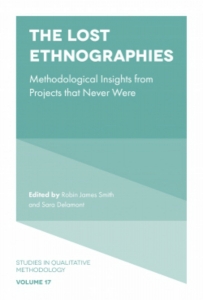In The Lost Ethnographies: Methodological Insights from Projects that Never Were, Robin James Smith and Sara Delamont bring together a range of contributors who place loss at the centre of the ethnographic method by reflecting on unsuccessful funding bids, fieldwork problems, writing difficulties and uncompleted projects. The cumulative effect of these chapters provides rich and layered insight into the ethnographer’s world, writes Helen Kara, and shows how we can learn from failure and absence.
The Lost Ethnographies: Methodological Insights from Projects that Never Were. Robin James Smith and Sara Delamont (eds). Emerald Publishing. 2019.
 Find this book (affiliate link):
Find this book (affiliate link): ![]()
I was seduced by the subtitle of this book: Methodological Insights from Projects that Never Were. Research methods, and research ethics, are my primary interests. This no doubt helped me to find the book engaging, but I think it was not the only reason. This book is wide-ranging and well-written. Each chapter has a distinct voice and those voices harmonise pleasantly into a whole, which points to diligent work by the editors, Robin James Smith and Sara Delamont.
Most of the contributors are from the UK, though there are also essays from Australia, New Zealand and the US. Their topics of study are highly varied, including (among others) opera, parkour, schooling, comedy, cryptozoology and the partnership management of a community learning centre. Who would have thought that the last of those could have generated conflict so traumatic for the researcher that she was unable to publish her findings for more than a decade?
While I am not an ethnographer myself, I have studied ethnography as a method over the last twenty years. In the process I have read a range of ethnographies and books, chapters and articles about ethnography. This volume, in its focus on ‘the lost’, takes an unusual approach. Yet, as Katie Fitzpatrick states in her insightful final chapter, being lost is a central feature of the ethnographic method.
In their introduction, editors Smith and Delamont assert that the key themes of the book are around unsuccessful funding bids, fieldwork problems, writing difficulties and projects that just never got space to exist. It seems to me that a fifth key theme is emotion, and a sixth is ethnography itself: how it works, what it is for and where its boundaries lie.
Some authors write explicitly of emotions experienced in ethnographic moments: curiosity, anger, amusement, hostility and so on. Yet emotion seeps out from between the lines of this text even when the authors seem to be striving for detachment. Delamont and Paul Atkinson write of an argument between them almost as if it happened to other people, yet I sensed the shock and rage that people can experience when they realise they have very different memories of the same event. Sally Campbell Galman gives a factual account of falling ill and breaking her foot in India while family problems in America proliferated; she refers to her physical pain, but it was her undescribed emotional pain that resonated with this reader. I could cite many other examples – and, of course, there is a great deal of sadness and frustration around the ‘lost ethnographies’ themselves. There is joy, though, too, and delight, even catharsis, in returning to projects that were deemed unsuccessful and turning them into useful book chapters.
Image Credit: ‘365.260 – Nine To Five’ by Al Ibrahim licensed under CC BY SA 2.0
These tales of ethnographies that didn’t work shed a great deal of light on how ethnography does work. There are fascinating stories of the multifarious ways in which ethnography begins, such as David Calvey’s lifelong love of comedy leading to ‘guerrilla style interviews’ backstage in comedy clubs, or Katy Vigurs responding to a newspaper advertisement for a doctoral scholarship. Some of these ‘lost ethnographies’ were actually completed, such as Vigurs’s doctoral work and Martin Forsey’s school ethnography; here, the losses are in other areas, such as unrepresented participants and unwritten outputs. Susie Scott has used these kinds of lacunae to theorise and study absences, arguing that these are created in society and have an impact on people and events. This demonstrates the interaction between ethnography and the broader landscape of social science.
Delamont and Atkinson, in their chapter on an opera project that didn’t get funded, hypothesise that it is the most interesting projects which are passed over for funding. James Smith builds on this in his appeal for wider understanding of ethnography’s value. He makes a strong argument for funders to judge ethnography on its own terms, not to compare it with more positivist methods and find it wanting, but to recognise its intrinsic worth for the study of everyday social life.
Scott, in closing her chapter on a swimming pool ethnography that never happened, reflects that her ‘lost ethnography hovers like Schrödinger’s Project […] simultaneously researched and not researched’. Fitzpatrick also takes a Schrödingerian approach to ethnography, asserting that it simultaneously exists and doesn’t exist. The boundary work this book does is, to me, one of its most interesting aspects. Several contributors reflect on the extent to which an ethnography can really be ‘lost’, as unfunded projects continue to influence their creators’ thinking, and unwritten outputs still haunt the author’s mind. It seems ethnography resists binaries: it can be both lost and found, begun and not started, finished and incomplete.
My main criticisms of this book are aimed at the publishers rather than the editors and contributors. The production is poor with many typos, sometimes several on one page, and in places the text looks more as though it has been photocopied than printed. There is an index, but it is scanty and didn’t help me to revisit passages with notable terms that I could clearly remember. For example, the late comedian Bernard Manning, who plays a central role in one chapter, does not appear in the index. (Maybe this index was compiled by the editors, but if so, it is not them I am criticising. Academic books need good indexes to be useful, and a good index is one compiled by a specialist indexer.) The book is also expensive at £65 for only 180 pages. It’s a hardback, but does it really need to be? These factors are barriers to the reading and use of this book, which is a great shame because the content is excellent.
For me, there is no chapter that is worth more than others. It is the cumulative effect of all these ‘lost ethnographies’ that provides rich and layered insight into the ethnographer’s world. If I was going to single out just one, it would probably be Fitzpatrick’s final chapter – but then there would be little point in reading this alone; it works so well because of all that has come before.
There is a delightful paradox in that publishing this book means the ‘lost ethnographies’ are now found. This is also thrifty work. Ethnographers are notorious for collecting far more data than they could possibly use, a practice some researchers regard as unethical because of its potential for contributing to research fatigue. It is good to see some of ethnography’s discards being retrieved from the waste disposal and recycled into this shiny new book. It shows us how we can learn from failure, from absence, from nothing. Through the alchemy of writing, these ethnographers’ losses become their, and our, gain.
Note: This review gives the views of the author, and not the position of the LSE Review of Books blog, or of the London School of Economics. The LSE RB blog may receive a small commission if you choose to make a purchase through the above Amazon affiliate link. This is entirely independent of the coverage of the book on LSE Review of Books.
Image Credit: (Al Ibrahim CC BY SA 2.0).









2 Comments